Is it cheaper to live in an RV than a house or apartment? The answer is most often yes.
However, there are some scenarios where that’s not always the case.
For example, if you only want to camp in luxury RV resorts and live in a huge motorhome, you can expect to pay a pretty penny.
Otherwise, RV living is a much more cost-effective lifestyle than living in a house or apartment.
In this article, you’ll learn:
Let’s dive deeper.
Is it Cheaper to Live in an RV Than a House or Apartment?
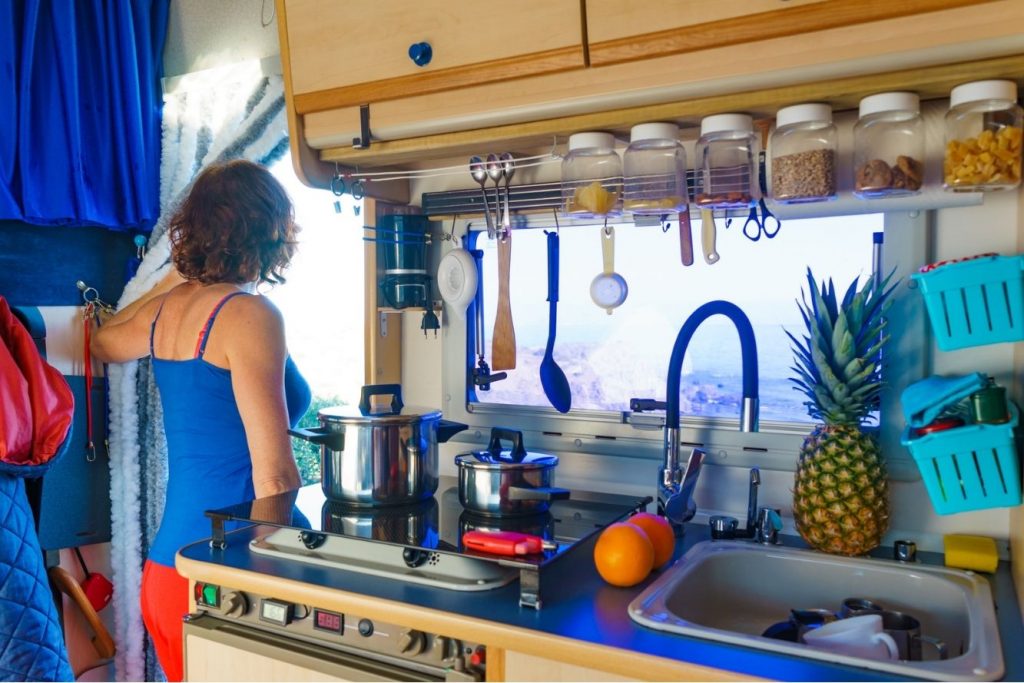
In many cases, yes. But, the overall answer is: it depends. Living in an RV can be way cheaper than living in a house or apartment, but it depends on you! If you know how to find budget-friendly and free camping options, it can be a lot cheaper.
However, if you only stay in luxury campgrounds, it might be more expensive.
For me personally, living and traveling in an RV saved me between $400 – $1,500+ per month, depending on where I was and what I was doing that month.
I went from paying $1,500/mo for a 1 bedroom apartment and around $300 on utilities each month to only paying for gas and the occasional campground.
Let’s compare the cost of RV living to renting or owning a home.
Average Mortgage Cost in the US
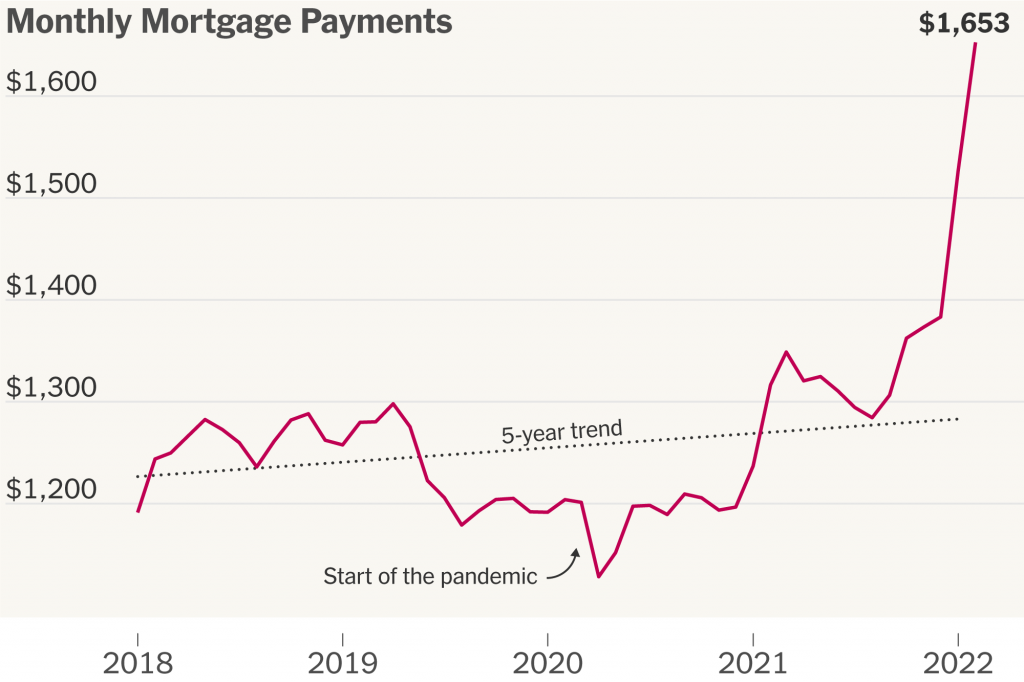
$1,487: that was the average monthly mortgage rate in the US According to the US Census Bureau’s American Housing Survey in 2019. And it's risen even more since the start of the pandemic.
This is the average of the entire nation – which means prices can vary widely from place to place.
In bigger cities, it will be higher. And in smaller towns, it will be lower. Here’s a look at some major cities:
Keep in mind these are just mortgage prices: this doesn’t include utilities like electric, water, gas, internet, etc.
Average Rental Costs in the US
$1,684: that’s the average price of a 1-bedroom rental apartment in the US according to a study by Rent.com. The national average for a 2-bedroom is $1,997.
This is just monthly rent: it doesn’t include utilities or other costs of living. Here’s a look at the same major cities.
These prices are for 1-bedroom apartments.
As you can see, average rental and mortgage prices are pretty similar. And in most places, they’re pretty high. It’s difficult to find a rental under $1,000 these days.
How Much Does it Cost to Live in an RV?
There is no actual “average” cost for living in an RV, because costs vary drastically person to person. You can generally expect to pay anywhere between $400 per month to $4,000 or more. That includes all costs, not just the price of your RV or campground.
$400 a month might sound crazy, but I think you can also do it on less if you're very frugal! On months where I strictly boondocked and didn't move far, I spent $0/mo on RVing related expenses. I just paid for groceries, my phone and other bills. No campground fees, gas, etc!
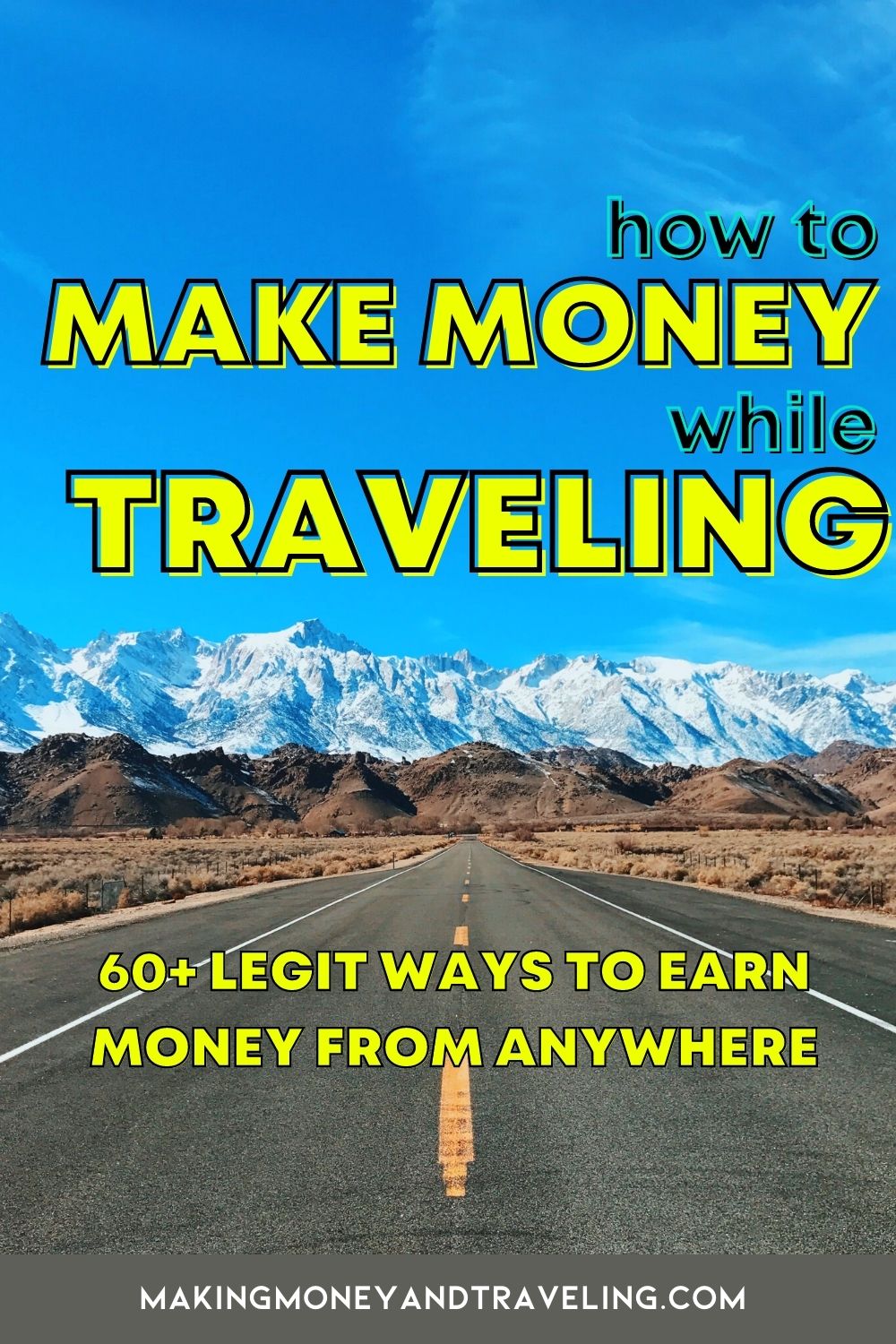
Download this FREE ebook learn 60+ ways to earn an income from anywhere!
Typical Costs Associated With Living in an RV
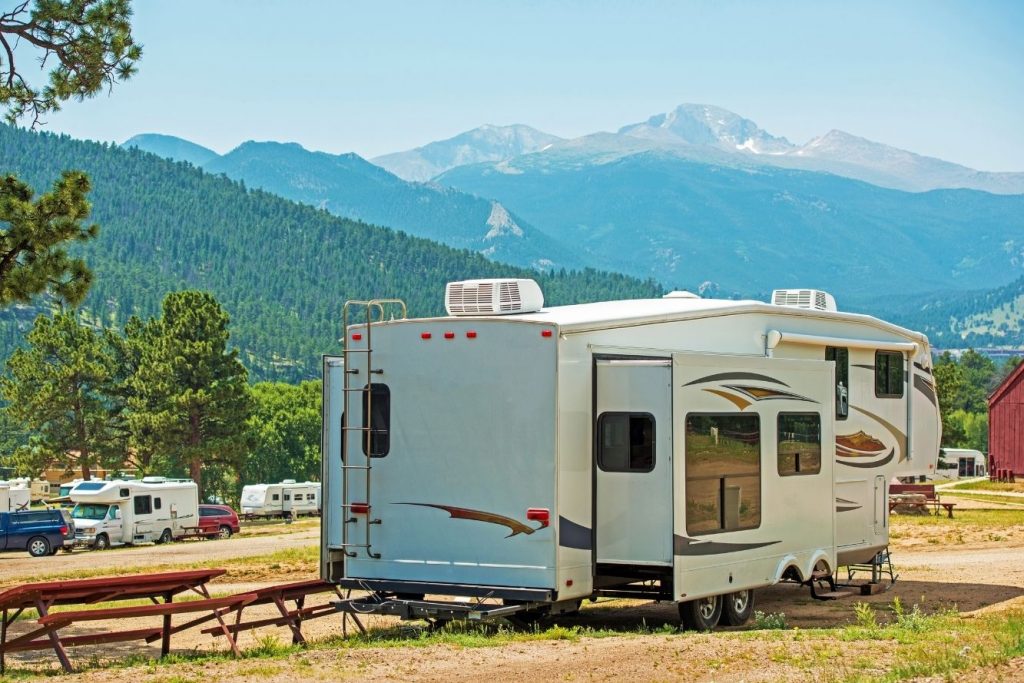
The typical costs associated with living in an RV include:
In most cases, you don’t have to pay utilities in an RV. During the winter and occasionally during the summer months, you will need to pay to fill your propane tank.
And some campgrounds charge utilities, especially for long-term campers. However, this isn’t common or done everywhere.
Compare this to a house where you have to pay your mortgage, water, electric, sewer, trash, gas, internet, and more – and that’s just to keep your house running!
That doesn’t even account for things like groceries, car payments, and phone bills.
Full-Time RV Travel vs Stationary RV Living Costs
When it comes to living in an RV full-time, there are two main options:
Full-time RV travel is just what it sounds like: living in an RV while you travel full-time.
Some people travel to a new place every week or two, while others travel at a pace of once a month. It’s up to you!
Stationary RV living is when you live full-time in your RV in one place.
This is a popular option for people who want to save money on housing costs but have to stay in the same town for their job, kids in school, family, or other reasons.
So, what are the cost differences between these two types of RVing?
Full-Time RV Travel
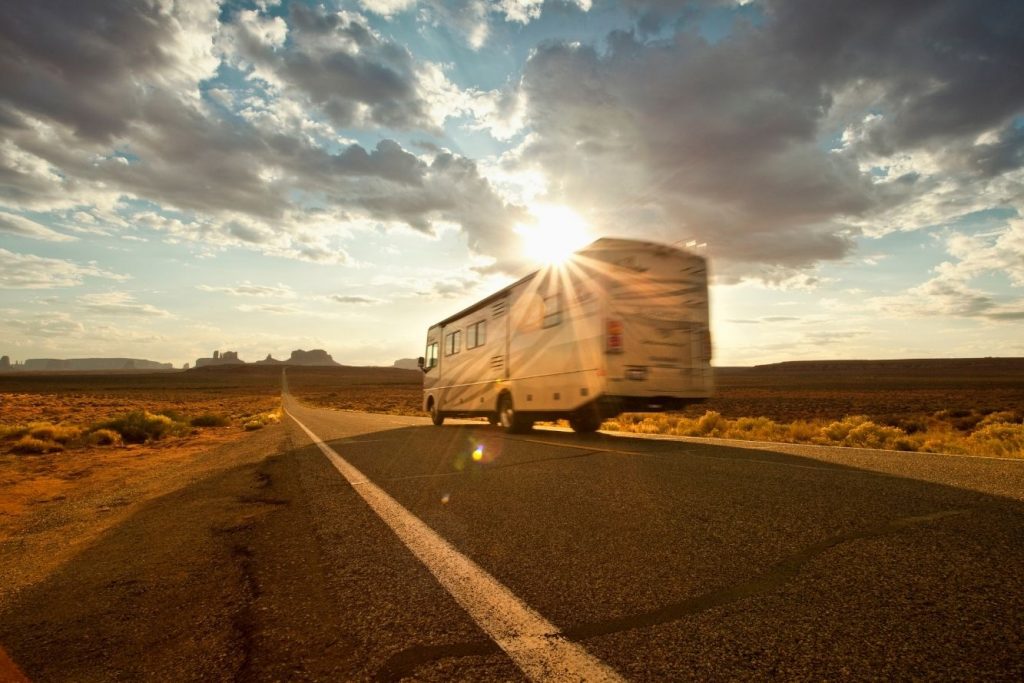
In many cases, full-time RV travel can actually be cheaper than stationary RV living. While this doesn’t seem logical, here’s why:
When you travel full-time, you can find places to camp for free for up to 14 days at a time. This is called boondocking and it is totally free and totally legal.
So, if you don’t pay for campgrounds, your biggest expense will be gas.
Additionally, there are RV clubs and memberships that provide RVers with crazy discounts on camping.
Harvest Hosts and Boondockers Welcome are camping memberships with one yearly price that allow RVers to camp for free at 3,000+ locations.
Thousand Trails is an RV camping membership that allows RVers to pay one yearly price and then camp at their network of RV resorts for totally free all year long.
Passport America gives RVers 50% discounts off of over 1,200 campgrounds.
Stationary RV Living
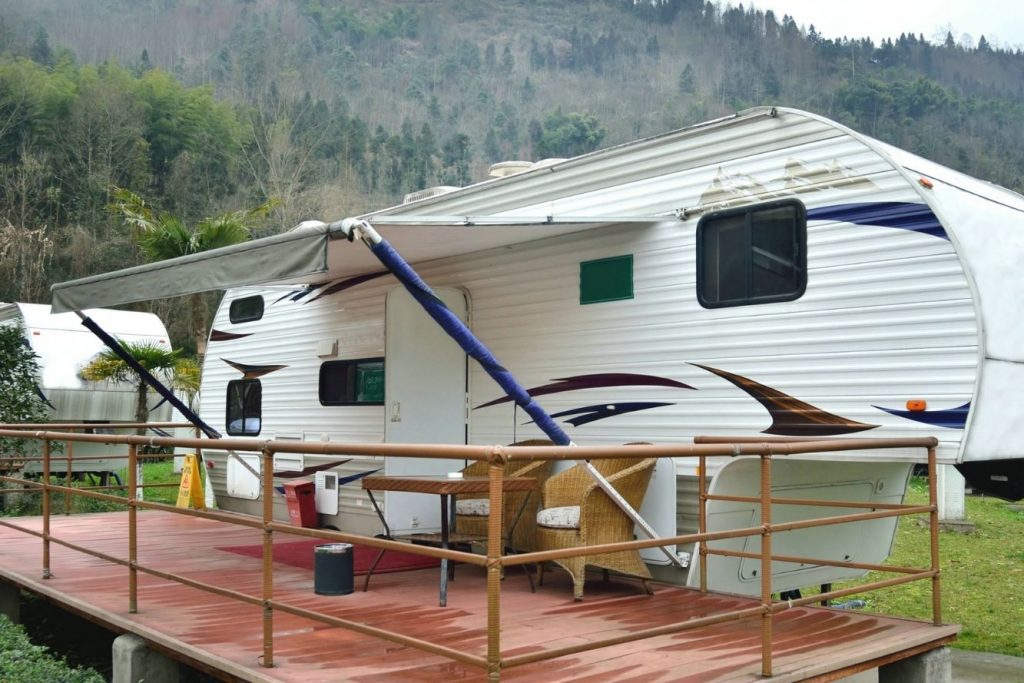
If you want to save money by living the stationary RV life, don’t fret! It can still be much cheaper than home ownership or renting.
The average nightly cost at a campground is between $40 and $50 per night nationwide. $45 x 31 nights in a month comes out to $1,395 – yikes! That doesn’t seem much better than a house or apartment… but wait.
The vast majority of campgrounds and RV parks offer a few different kinds of long-term camping discounts.
First, there’s the nightly rate. This is the highest price for camping at the campground. Then, there’s a discounted weekly rate. Next, there’s a bigger discount for a monthly rate. Finally, some long-term RV parks offer a big discount on campers who sign an annual lease.
While not every RV park offers weekly or monthly discounts, many do.
When I lived and traveled in my RV full-time, I liked to travel slowly and stay in one place for 1-3 months at a time. It helped me save money on gas and campground fees, and I got to experience the area like a local.
I stayed in a campground near Seattle, Washington for $250 per month. Then I moved to a beach town where the cost was only $315 per month. These campgrounds both had full hookups.
Sometimes I would stay for a week instead of 2-3 nights because the cost was the same.
Although I was traveling, I say this to let you know that most campgrounds offer long-term camping discounts.
Money-Saving Benefits of Living in an RV
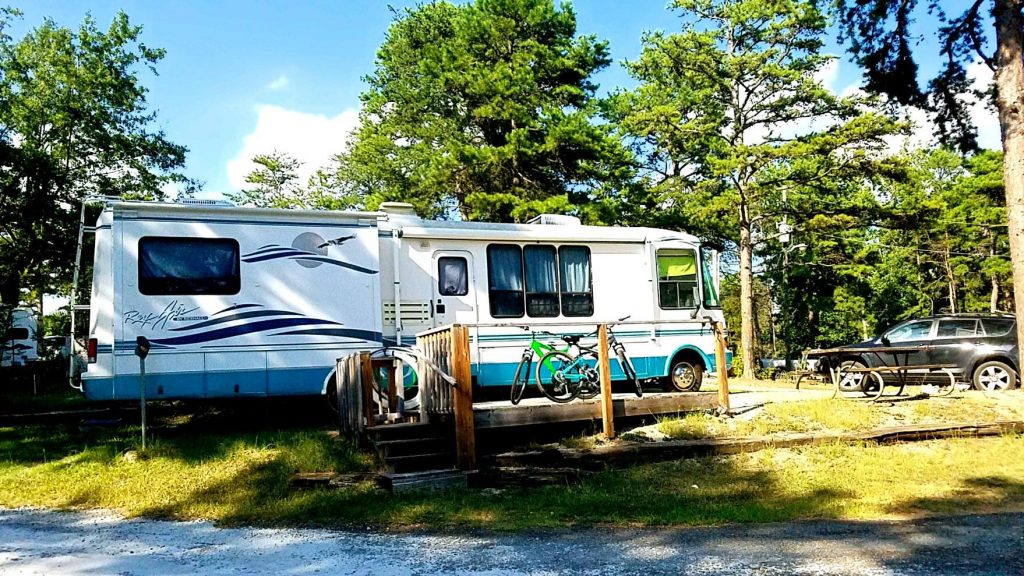
So what are the money saving benefits of living in an RV? Let’s take a look.
RVs are Cheaper and Easier to Own Than a House
Many RVs are way cheaper and easier to own than a house. In fact, you could buy a brand new travel trailer for $20,000 or less!
And you could buy a brand-new fifth wheel for around $50,000. And if you want to save money, used RVs are even cheaper.
This means that even if you do have a monthly payment, it’s not a lot. And the barrier to ownership is much lower than that of a house.
Campgrounds Give Big Discounts to Long-Term Campers
As I mentioned before, you can get big discounts when you choose long-term camping rates at most campgrounds.
You might be surprised at how low they’re willing to go when you decide to stay for a week, month, or year.
When Traveling, You Can Camp for Free
When you’re out on the road, you can camp for free for up to 14 days at a time. And when you’re just passing through a town or city, it’s usually pretty easy to find somewhere to park for free overnight.
Related: How Long Can you Park in a Store Parking Lot?
RV Clubs and Camping Memberships Cut Costs
RV Clubs and camping memberships can cut costs drastically.
Some camping clubs give you access to a huge network of places to camp for free all year, and others give you big discounts on camping.
Related: Best RV Clubs for Saving Money
Did You Know You Can Actually Make Money While Camping?
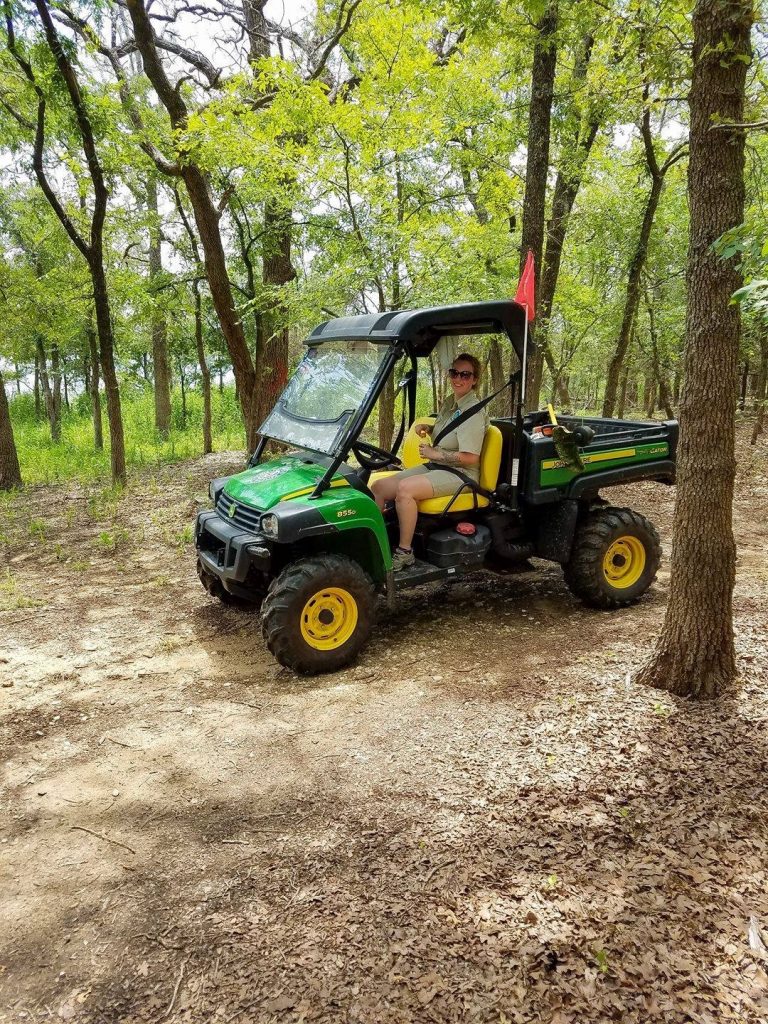
Did you know you can actually make money while camping? This is called workamping – where you literally get paid to camp.
Some workamping jobs will just give you a free full hook-up RV spot, but others will include a salary along with a free RV spot.
Workampers may do things like Campground Hosting, reception, janitorial, maintenance, and more.
Learn more about Workamping here.
Are There Any Cost-Related Downsides to Living in an RV?
There can be cost-related downsides to living in an RV. However, they don’t come close to the benefits in my opinion.
The biggest cost-related downside to living in an RV is the price of gas. However, traveling slowly allows you to spread out your gas spending over a longer period of time.
And, if gas is your only big expense, you can think of it as paying rent or your mortgage.
Tips for Saving the Most Money While Living in an RV
Thinking about RV life but want to save the most money? Here are some great tips.
Pay Off Your RV ASAP
I highly recommend paying off your RV ASAP. Not having an RV payment saves you so much money, and it feels so good!
If you can’t buy your RV outright, pay the highest down payment that you can so your monthly payments are lower.
Travel Slowly
Traveling slowly saves you money in two ways: you pay way less on campground fees due to long-term camper discounts. Additionally, you don’t need to buy gas as often, so it’s a win-win.
There are more benefits to traveling slowly than just saving money. When you’re in one area for a long period of time, you get to experience it like a local.
That’s my favorite part of RVing – getting to ‘live’ in so many places without ever being permanently tied down.
Use Camping Memberships and RV Clubs
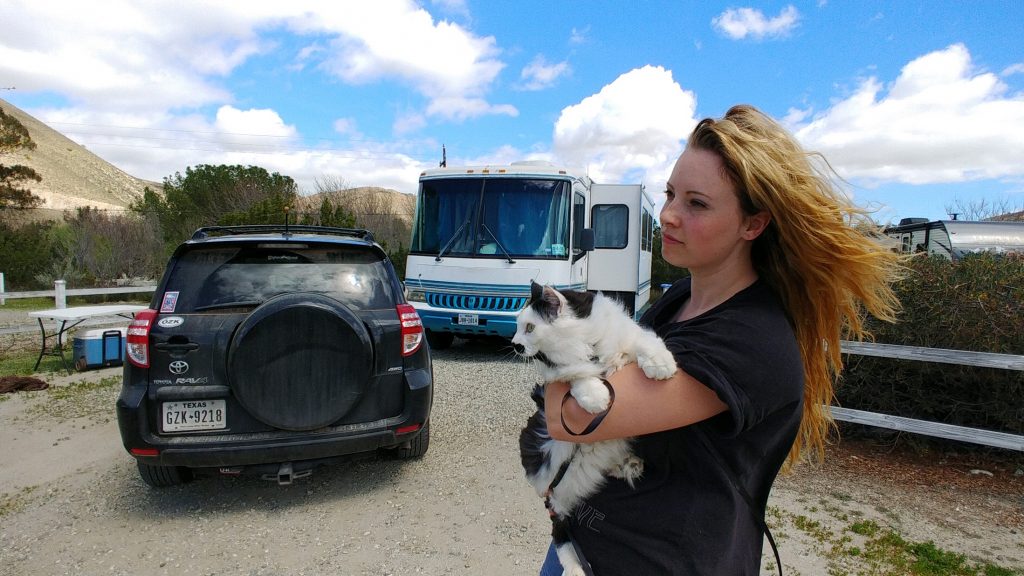
I cannot stress this enough: sign up for camping memberships and RV clubs.
Prices for most camping memberships and RV clubs range from $40 per year to $100 per year, but they’re so worth it!
My Passport America membership paid for itself during the first night of using it.
And Thousand Trails was a lifesaver when traveling because I got to stay in huge RV resorts with tons of amenities for free! This one is more expensive, but still totally worth it in my opinion.
Harvest Hosts and Boondockers Welcome open up new doors with tons of places to stay on what would normally be private land – for free.
Escapees RV Club gets you discounts on camping, but so much more too! Members get discounts on RV tires, insurance, fuel, and so much more.
Related:
- Harvest Hosts Review: Pros, Cons, and Discount Code
- Escapees Mail Service Review: Is This The Best RV Mail Forwarding Service?
Don’t Visit Tourist Destinations During Busy Season
This one bears repeating.
Try to visit popular tourist destinations during the off-season. Everything is more expensive during the busy season… and I mean everything.
Gas is more expensive, it’s harder to find parking and campgrounds and they’re more expensive, and activities are more expensive.
Not to mention crowds. Crowds are the worst!
Travel On Weekdays and Avoid Holiday Travel
Gas prices are usually cheaper on weekdays and the roads are less crowded. It’s a good idea for both your wallet and your sanity.
Additionally, avoid travel during holiday weekends. And if you plan to be in a campground on a holiday weekend, book it several months in advance.
Not having somewhere to stay on a busy holiday weekend is stressful, and you’ll probably end up spending a lot on last-minute accommodations.
Boondock Whenever Possible
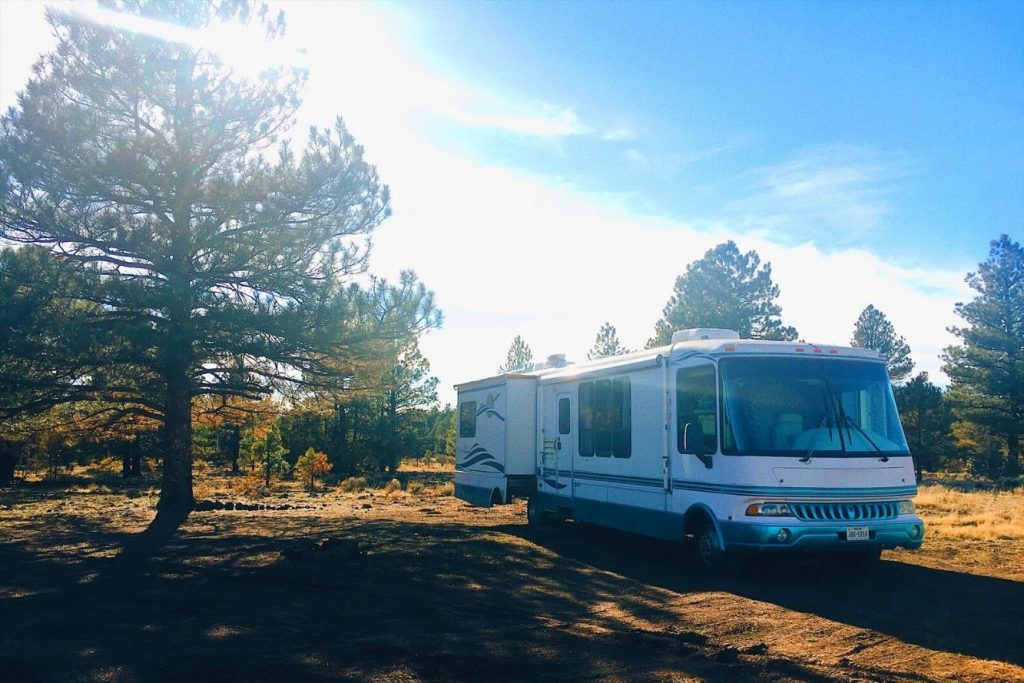
Finally, boondock whenever possible.
Whether you’re using a membership like Harvest Hosts or Boondockers Welcome or you’re boondocking on BLM land, it saves so much money.
I stayed in the Sedona, Arizona area for two months for $0 by staying in different BLM camping areas for 14 days at a time. It was amazing and I can’t wait to do it again!
Plus, I only spent around $25 during that entire time, and that was just to pay to dump my RV tanks and take showers.
Related: 12 Resourceful Ways To Save Money While Living in an RV
Wrapping Up: RV Living Can Be Cheaper If You Want it To Be
So – is it cheaper to live in an RV? I want to say a resounding yes! But, we both know that it can also be more expensive if you prefer a luxury lifestyle.
For me personally, living in an RV was way cheaper than living in my 1-bedroom apartment.
What’s even better is I got to see the country while saving a ton of money… It seems too good to be true, but it isn’t!
Free Printable RV Checklist Bundle
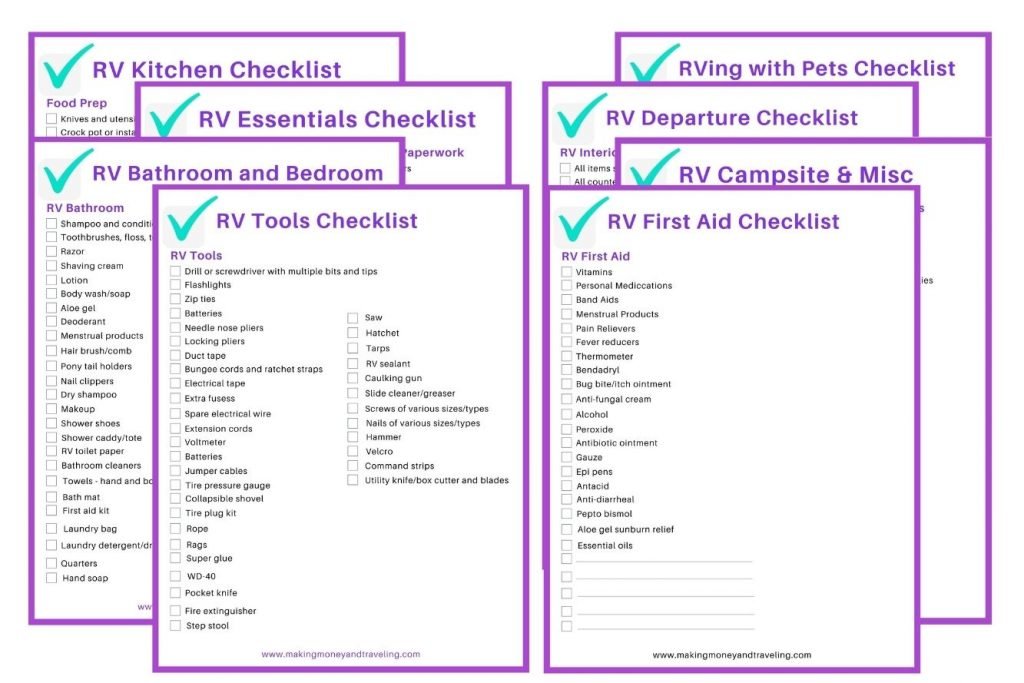
I put together an Ultimate RV Checklist bundle of 8 RV checklists! If you'd like the bundle, just put in your name and email below and I'll send them right over!

Carrie Wilder
Carrie has a passion for location independence and nomadic lifestyles. After traveling full-time in an RV and living the van life, she created Making Money and Traveling to help others make the switch to a remote lifestyle. Learn more about Carrie on the About page or connect on social media below.
Download this FREE ebook learn 60+ ways to earn an income from anywhere!